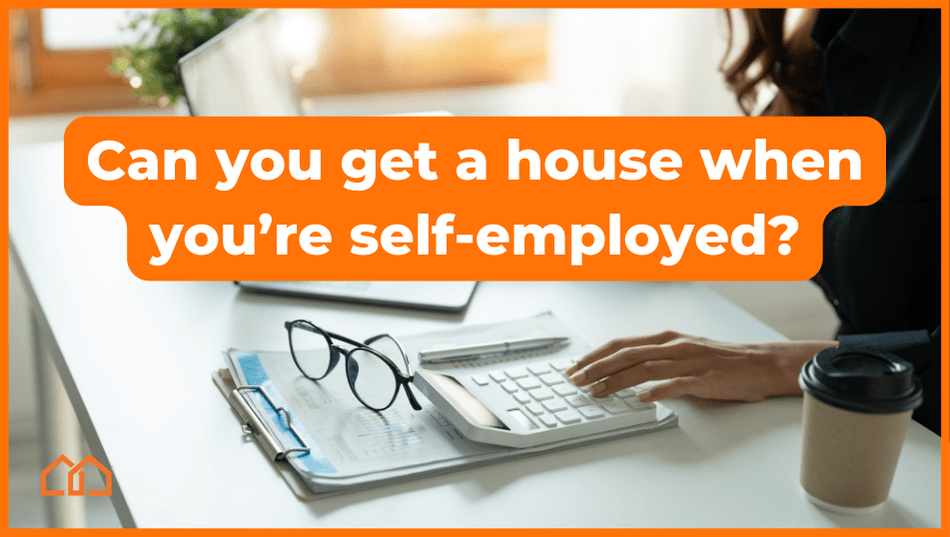Can you buy a house if you’re self-employed?
If you’ve ever needed to make a big-ticket purchase and weren’t able to pay in cash, you’re not alone. A home loan makes homeownership possible for many people, splitting up the total cost into manageable monthly payments.
Though the rewards are great, the mortgage application process is lengthy. Thankfully, you would be in the hands of a mortgage lender who will do their best to qualify you. One of the key criteria is proving employment or a steady income. This process is more straightforward when you submit concrete financial records like W-2 pay stubs and your most recent bank statements.
But how can you prove a steady income when you’re a self-employed borrower? Can you still become a homebuyer if you’re self-employed?
- Disclaimer: While we know a good share about loans and how to qualify, nobody is going to know more than a financial advisor and your lender. Speak with these pros to get the most up-to-date information on how to qualify as a self-employed individual.
How to Buy a House When You’re Self-Employed
Rest assured that you can still qualify for a mortgage loan just like a salaried employee. You just need to provide as much information as possible about your income.
Overall, qualifying for a mortgage when you’re self-employed takes more work compared to being a traditional employee. Whether you want a conventional loan, FHA as a first-time homebuyer, VA loan, or USDA loan, all mortgage lenders require plenty of documentation from freelancers.
However, the process isn’t too different from the standard route. Here are the basic steps to follow:
1. Prepare Your Finances
This first step applies to anyone seeking a loan. Do everything you can to make your financial profile look great. During the underwriting process, your lender will look at your financial track record, which includes your income, savings account, sources of income, years of self-employment, and much more. This evidence all adds up to figure out if you can handle your future mortgage payments.
Here is the short list of things to prepare:
a. Improve your credit score and DTI.
Since you’re self-employed, you typically need a higher credit score to boost your profile. Achieving a good credit report this takes some time, but it helps you snag better interest rates. Improve your debt-to-income ratio, stay on top of debt payments, do not open and close too many credit cards, and establish longer credit ages.
b. Put money in the bank.
Self-employed people don’t have traditional w-2s to prove their income. Instead, bank statements and other proof of cash flow can show your financial stability. Showing a series of bank statements with savings in your account boosts your profile.
Also, tax returns provide invaluable insights to support your application. As an independent contractor, having as much proof of strong personal finances is a must. Speak with a CPA to organize these documents in advance.
c. Present all relevant income statements.
Many self-employed people get payments through other portals like Quickbooks, PayPal, Venmo, Clover, and other digital payment services. If you’re a business owner who gets paid through any of these services, they should allow you to download monthly and yearly statements that your loan officer can use. Simply request a statement from the service’s app and send copies to your lender as you would a typical pay stub.
d. Wait to establish a history of self-employment income.
Just like with longer credit histories, proving long-term self-employment income is better than applying for a loan when you just start a venture. So, try to time your loan application after you established some history. Wait to apply for a loan if you haven’t been in your current venture for at least six months to a year.
- Need long-term proof of income? A good rule of thumb is to wait for the IRS’s transcripts to have enough information from your personal tax returns to boost your application along with your bank statements.
2. Make the Largest Down Payment Possible
If you can’t pay in all cash, then putting as much cash into the loan will give you the best results. Not only will you avoid expensive mortgage insurance, but you can pay down your interest points to lower your monthly payments even more. Larger down payments also make you look better on paper when you apply for a loan. But how do you get this lump sum if you don’t have it in the bank?
a. Use a personal Loan.
You may be in a position to borrow money from a private lender, a friend, or a relative. Note that private loans have rather high-interest rates and should be approached with caution. Nevertheless,
b. Cash out on another property.
If this isn’t your first home, then you can unlock equity through a cash-out refinance or through selling it altogether. However, selling an existing home can be a headache if the timing isn’t right. You can potentially be stuck living in a hotel or relative’s house longer than you prefer. Not to mention, you need to put your belongings in expensive monthly storage and pay twice to move everything.
- Our solution? Sell & Stay! We’ll buy your home, give you the cash proceeds, and then let you stay in it as a renter until you’re ready to close on a new construction home.
c. Save up the old-fashioned way.
Not the most riveting option, but you can grow your buying power by living frugally and putting money aside each paycheck. This process can take time, but it can be accelerated if you make some cuts to big-ticket expenses, such as selling an extra car or moving in with a relative for a season.
- Note: If you have a fair amount of savings, talk to a financial advisor to see if there are any investment options that can help grow your money faster than a traditional bank account.
3. Apply for a loan at or below your top dollar.
Self-employed individuals should be realistic about what they can afford every month. This advice applies to any type of mortgage, like VA loans, FHA, and more. Unlike salaried positions where the income is predictable, a self-employed person may work off commissions or a small business’s profits. This can result in a fluctuation of earnings per month.
It would be best if you based your loan program qualifications on your lower average monthly income and not try to borrow according to your maximum earnings. You always want to play it safe and shoot for a loan that you can reasonably afford – even when you’re in a bad month. Your lender will be looking at this factor too.
4. Co-sign with a salaried person.
If you have home in mind that requires a higher loan amount, you can co-sign with a relative or partner with a stable income. This will enable you to combine your self-employed income with a predictable monthly installment that your lender can approve more easily.
This should only be used when you are absolutely sure you want to co-sign and cooperate with the other individual. You should also have a net income that can handle your future mortgage. This process gives you the advantage of having a higher loan potential, which means more options.
Can You Buy a House if You’re Self Employed?
Self-employed applicants can definitely get the home of their dreams. While a financing professional helps you through the mortgage process, we can take care of the real estate side. Contact us today and let our expertise work for you.
Alicia Persson is a Content Strategist SEO writer at Marketplace Homes, utilizing previous years of experience on real estate teams that specialized in investments and property management. Before she joined Marketplace Homes, she was also a freelance writer for 7 years, leading to a specialization in real estate and home living content for boutique digital marketing agencies. During her writing years, she learned the basics of SEO and gained experience writing for many different clients, making her versatile at creating diverse content.
She is a proud University of Virginia master’s graduate and enjoyed her undergraduate years at the University of Mary Washington. When Alicia is not writing, she plays keytar and sings in a local 90’s rock cover band, or she spends time with her amazing family.

